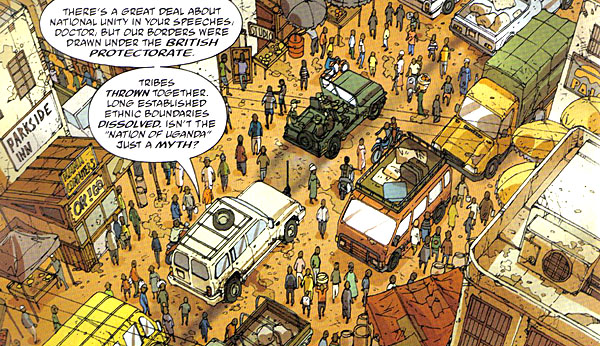 Written by Joshua Dysart
Written by Joshua Dysart
Art by Alberto Ponticelli
32 pages, color
Published by Vertigo/DC Comics
When is an Unknown Soldier not an unknown soldier? In the case of this new revamp of the old DC Comics property, it’s when you know the titular character’s name and history from the opening pages of the comic, onwards. Joshua Dysart and Alberto Ponticelli’s take on this iconic character from DC’s past is breaking a lot of the old rules, here, and the end result is something that certainly bears paying attention to.
It’s 2002, and Dr. Lwanga Moses and his wife Sera are only two years into their return to Uganda, the country that Lwanga and his family fled when he was just seven years old. Both doctors and running a clinic in Kampala, Lwanga and Sera are good people who try to bring humanitarian aid to Uganda. As a country whose recent history includes genocide, famine, and guerilla armies of children, it’s a long uphill battle to fight. But Lwanga is having nightmares involving himself and extreme violence—and those feelings and urges are getting stronger by the day. When everything comes to a head during his trip to an internally displaced person camp in northern Uganda, will it be the death of Lwanga and everything he’s tried to preserve?
 This may sound strange, but I have to simultaneously applaud and question Dysart’s decision to set Unknown Soldier in the heart of Uganda and historical (and ongoing) events within this troubled country’s lifetime. On the plus side, by not using a stand-in for Uganda it firmly places the comic in our own world, with such horrors and atrocities that readers may already know about and can instantly link to what they read in this comic. It’s an automatic extra gut punch, knowing just how bad a situation that Lwanga and Sera Moses are in the heart of with each passing moment. This isn’t some impossible villain that you can sneer at, it’s a real world problem that you want to see somehow solved.
This may sound strange, but I have to simultaneously applaud and question Dysart’s decision to set Unknown Soldier in the heart of Uganda and historical (and ongoing) events within this troubled country’s lifetime. On the plus side, by not using a stand-in for Uganda it firmly places the comic in our own world, with such horrors and atrocities that readers may already know about and can instantly link to what they read in this comic. It’s an automatic extra gut punch, knowing just how bad a situation that Lwanga and Sera Moses are in the heart of with each passing moment. This isn’t some impossible villain that you can sneer at, it’s a real world problem that you want to see somehow solved.
At the same time, though, that’s exactly the problem with Dysart’s setting Unknown Soldier in our world. The Lord’s Resistance Army still exists in 2008, and Uganda’s problems aren’t exactly gone. Dysart has put his main character in an unsolvable situation, one where the big picture outcome can’t be changed without breaking with the reader’s trust. So while the frustration of having Lwanga in a place that he can’t fix is certainly something that Dysart can use to his advantage, it also runs the risk of alienating his readers. I’m not saying that I want to see Lwanga as the Unknown Soldier magically fix an entire country’s problems (with a comic that so far is firmly rooted in the real world, it would feel implausible at best), but knowing that even an organization that he’s going head-to-head with will still be around at the end of the day makes it feel like reading this book could invoke feelings of futility. It’s a fine line that Dysart’s going to have to walk, and I’m still not entirely sure how I feel about that.

As for the rest of the story, it certainly holds promise. Dysart’s clearly done his research on the conflict in Uganda, and Lwanga seems like an interesting enough character, although I’m a little nervous about exactly where he’s going with Lwanga’s visions of the Unknown Soldier. It feels a tiny bit too Grendel-esque for my comfort, but I’m more than willing to see where it goes. Ponticelli’s art is certainly strong, able to handle tight close-ups on characters and large, sweeping scenes with equal ease. I love how he draws scenes like the streets of Kampala from above, or the huts of the IDP refugee camp. Perhaps best of all, the scenes with violence in Unknown Soldier #1 are incredibly disturbing. I appreciate that he doesn’t undercut what Dysart has happen here, or sanitize the scene in any way. This is supposed to be disturbing, and that’s exactly what we get.
A first issue of a new title should grab the reader’s attention, and make them genuinely curious to see what happens next. Dysart and Ponticelli have certainly succeeded on both counts with Unknown Soldier #1. It’s not always comfortable reading at times, but I think in this case that’s actually a plus. They’ve earned my attention, and I’ll definitely be back to see where they go next.
